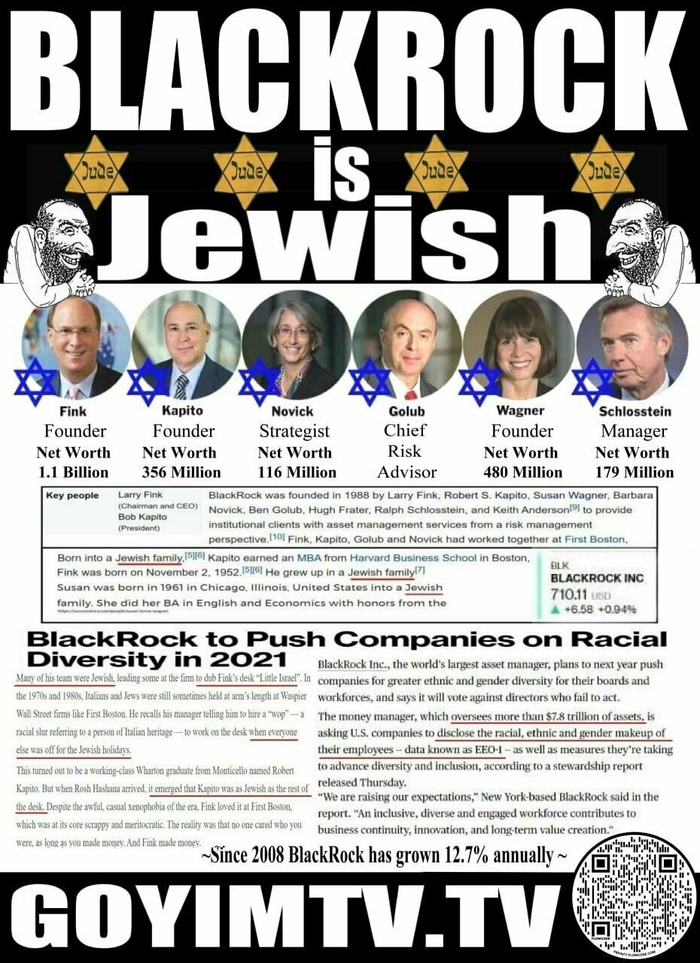BlackRock, one of the largest investment management firms in the world, often finds itself at the center of discussions and debates about its leadership. The question "are BlackRock executives Jewish?" has gained traction in recent years, fueled by curiosity and misinformation. This article delves deep into the origins of this inquiry, the factual basis behind it, and the importance of understanding diversity within corporate leadership. As we explore this topic, it's crucial to approach it with an open mind and a commitment to truth.
Corporate diversity is a cornerstone of modern business practices, and understanding the backgrounds of influential executives can provide valuable insights into organizational culture. The question about BlackRock's executives being Jewish has sparked interest not only because of the company's prominence but also due to the broader implications of diversity in leadership roles. By examining the facts, we aim to dispel myths and foster a more informed perspective on this subject.
This article will explore the origins of the question, analyze the backgrounds of key BlackRock executives, and address the significance of diversity in corporate environments. Our goal is to provide a comprehensive overview that respects the complexity of the topic while maintaining a focus on factual accuracy and respect for all communities involved.
Read also:Discover The Magic Of Harrahs New Orleans A Complete Guide
Who Are BlackRock Executives?
Before diving into the specifics of the question, it's essential to understand who BlackRock executives are and what they represent. BlackRock, founded in 1988, has grown to become a global leader in investment management, with assets under management exceeding $10 trillion. The company's leadership comprises a diverse group of professionals with varied backgrounds and experiences.
Key executives include Larry Fink, the CEO, and other high-ranking officials who play pivotal roles in shaping the company's direction. Understanding their individual journeys and contributions to the firm provides context for the broader discussion about diversity and representation within BlackRock's leadership team.
What Is the Background of BlackRock's Leadership?
The leadership team at BlackRock reflects a mix of educational, professional, and cultural backgrounds. Larry Fink, for instance, has a storied career in finance, marked by achievements and challenges that have defined his tenure as CEO. Below is a table summarizing the key biographical details of some prominent BlackRock executives:
- Larry Fink – CEO
- Rob Kapito – President
- Barry Schwartz – Global Head of Aladdin Business
| Name | Position | Education | Key Achievements |
|---|---|---|---|
| Larry Fink | CEO | BA in Political Science, UCLA | Founded BlackRock, expanded global presence |
| Rob Kapito | President | BA in Economics, Brown University | Co-founder of BlackRock, instrumental in growth strategies |
| Barry Schwartz | Global Head of Aladdin Business | BS in Economics, University of Maryland | Developed Aladdin risk management platform |
Why Is the Question "Are BlackRock Executives Jewish" Relevant?
The relevance of this question lies in its intersection with discussions about diversity and representation in corporate leadership. While some may view the inquiry as innocuous, it can also perpetuate stereotypes or misinformation if not addressed carefully. Understanding the motivations behind such questions helps foster a more nuanced conversation about identity and leadership.
Are BlackRock Executives Jewish? Unpacking the Facts
When examining the backgrounds of BlackRock executives, it's important to approach the question with sensitivity and a commitment to accuracy. While some executives may identify as Jewish, others come from diverse religious and cultural backgrounds. The diversity within BlackRock's leadership team reflects the company's commitment to inclusivity and global representation.
How Does Diversity Impact Corporate Leadership?
Diversity in corporate leadership brings a wealth of perspectives and ideas to the table. It fosters innovation, enhances decision-making processes, and strengthens organizational resilience. By embracing diversity, companies like BlackRock can better serve their global client base and address the complex challenges of the modern financial landscape.
Read also:Celine Dions Son A Comprehensive Look Into His Life And Journey
Why Does Diversity Matter in Leadership?
Diversity in leadership is not just a moral imperative; it's a strategic advantage. Companies with diverse leadership teams tend to perform better financially, attract top talent, and build stronger relationships with their stakeholders. For BlackRock, embracing diversity is part of its broader mission to create value for clients and society.
What Role Does Religion Play in Corporate Culture?
Religion plays a complex role in shaping corporate culture, influencing everything from workplace policies to employee engagement initiatives. While some companies actively promote religious diversity, others focus on creating inclusive environments where all employees feel valued and respected. At BlackRock, the emphasis is on fostering a culture of collaboration and mutual respect, regardless of individual beliefs or backgrounds.
How Can We Address Misinformation About Corporate Leadership?
Misinformation about corporate leadership can spread quickly, fueled by social media and online forums. To combat this, it's essential to rely on credible sources and fact-based analysis. Engaging in open, respectful dialogue and encouraging critical thinking can help dispel myths and promote a more accurate understanding of the topic.
What Are the Challenges of Discussing Identity in Leadership?
Discussing identity in leadership can be fraught with challenges, as it often touches on sensitive topics such as race, religion, and cultural heritage. Navigating these discussions requires empathy, respect, and a commitment to truth. By focusing on the contributions and achievements of leaders rather than their personal identities, we can foster a more inclusive and informed discourse.
Are BlackRock Executives Jewish? Understanding the Broader Context
To fully understand the question "are BlackRock executives Jewish," it's important to consider the broader context of diversity in corporate America. While some executives may identify as Jewish, others come from a variety of backgrounds, reflecting the company's commitment to inclusivity and global representation. By celebrating this diversity, BlackRock sets an example for other organizations seeking to build more equitable and representative leadership teams.
What Can We Learn From This Discussion?
Discussing the backgrounds of corporate leaders provides valuable insights into the importance of diversity and representation in business. It highlights the need for transparency, respect, and a commitment to truth in addressing sensitive topics. By engaging in open, respectful dialogue, we can foster a more inclusive and informed understanding of the world around us.
Conclusion: Embracing Diversity in Leadership
In conclusion, the question "are BlackRock executives Jewish" serves as a starting point for a broader discussion about diversity and representation in corporate leadership. By examining the backgrounds of key executives and understanding the importance of inclusivity, we can gain a deeper appreciation for the complexities of modern business environments. As we continue to explore these topics, let us approach them with an open mind, a commitment to truth, and a desire to learn from one another.
Table of Contents
- Who Are BlackRock Executives?
- What Is the Background of BlackRock's Leadership?
- Why Is the Question "Are BlackRock Executives Jewish" Relevant?
- Are BlackRock Executives Jewish? Unpacking the Facts
- How Does Diversity Impact Corporate Leadership?
- Why Does Diversity Matter in Leadership?
- What Role Does Religion Play in Corporate Culture?
- How Can We Address Misinformation About Corporate Leadership?
- What Are the Challenges of Discussing Identity in Leadership?
- Are BlackRock Executives Jewish? Understanding the Broader Context
This comprehensive exploration of the topic aims to provide clarity, foster understanding, and promote a more informed discussion about diversity in corporate leadership. By embracing the complexities of identity and representation, we can build a more equitable and inclusive future for all.


